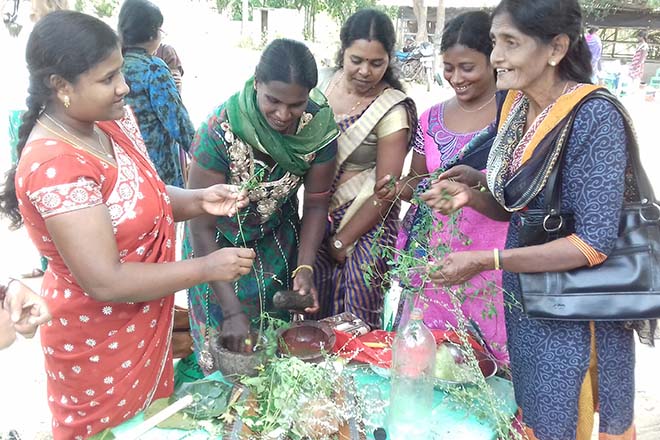buy elavil online http://miamihealth.com/mobile/imgs/jpg/elavil.html
But let’s put that fact aside. Livelihood building initiatives for poor communities, often run by NGOs and charities, tend to focus on increasing incomes. However, in much of our country the available income generation opportunities are miserly and are demeaning. For many, options to earn money are limited to selling their labour for a low price or their bodies for even less. A much overlooked solution to the Micawber Conundrum instead of increasing Income is reducing Expenditure. This article comes out of conversations with Rev.Joshua Sivagnanam, a Christian priest who has worked for many years tending to the economic and spiritual needs of the population of the Kilinochchi and Mullaitivu districts in the Northern Province. Districts which, according to data from the Sri Lanka Government’s Department of Census and Statistics, are the poorest in our nation.
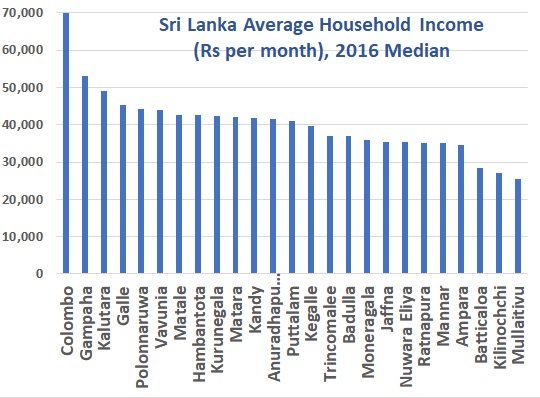 The graph shows the “Median Household Income”, which means half of families are living on less than this. Some on far less.
Rev. Joshua’s wisdom is directed principally at the rural communities scratching a living from an acre or two of farmland. But perhaps he has lessons for the increasing number in Colombo squeezing themselves into ever smaller and ever more expensive condominiums. Even if you don’t have room to swing a bag of manioc in your condo-kitchen, there are things to be learned from Rev. Joshua that may make your urban lives just a little bit less miserable. The manioc in that bag you can’t swing has delicious nutritious treasures hidden in plain sight that you may be unwittingly throwing into the garbage.
Rev. Joshua laments that women from rural areas who work long hours in a factory earning Rs16,000 a month take all that money to the local shop to buy food they could instead source for free from their own land. When they walk through their acre of land from their home to the shop, they unknowingly step over many vegetables that would make tasty and nutritious meals for their families. Even the vegetables they do pluck have delicious parts, perhaps the leaves or the roots or the bark, that are cut off and thrown away. With a bit of traditional knowledge their families could eat more from their own land, and keep more of their hard earned rupees in their pockets.
The graph shows the “Median Household Income”, which means half of families are living on less than this. Some on far less.
Rev. Joshua’s wisdom is directed principally at the rural communities scratching a living from an acre or two of farmland. But perhaps he has lessons for the increasing number in Colombo squeezing themselves into ever smaller and ever more expensive condominiums. Even if you don’t have room to swing a bag of manioc in your condo-kitchen, there are things to be learned from Rev. Joshua that may make your urban lives just a little bit less miserable. The manioc in that bag you can’t swing has delicious nutritious treasures hidden in plain sight that you may be unwittingly throwing into the garbage.
Rev. Joshua laments that women from rural areas who work long hours in a factory earning Rs16,000 a month take all that money to the local shop to buy food they could instead source for free from their own land. When they walk through their acre of land from their home to the shop, they unknowingly step over many vegetables that would make tasty and nutritious meals for their families. Even the vegetables they do pluck have delicious parts, perhaps the leaves or the roots or the bark, that are cut off and thrown away. With a bit of traditional knowledge their families could eat more from their own land, and keep more of their hard earned rupees in their pockets.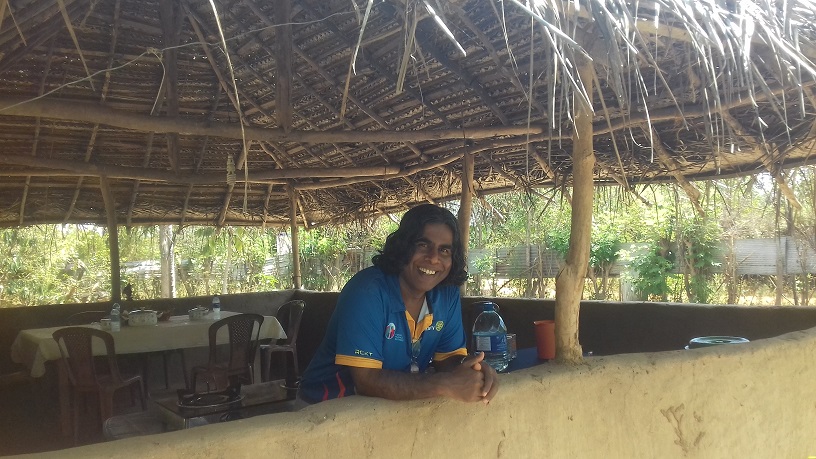 Rev. Joshua (RJ) was born in Kegalle, 40 kilometres from Kandy. As an eight year old child in 1983 his was one of many Tamil families who fled Kegalle in the early stages of the Sri Lankan Civil War. His family, both parents with four sisters and himself, lived on the poverty line even before they fled their home. The government sent them to the jungles of Killinochchi where the land was wild with trees and bushes. Families were left to clear the land themselves at a time when there were hardly any NGOs or any other support for the displaced people. When they arrived there was nothing: no shelter; no toilet facilities; no water; no food. They had to provide everything for themselves.
These “Internally Displaced Persons” (IDPs) built themselves shelter, making walls and roofs from the mud and clay of the ground and from tree branches. They foraged food from the leaves and the vegetables they found in the jungle.
RJ said: “We had big challenges due to the wild elephants, and many people were killed due to them. But we had no option to move anywhere else. The families worked together to shout and make noise to chase away the elephants. I couldn’t forget that at that time to clear land we cut the trees and bushes and burned the stubble. Then, after the night rains, the very next morning we could see small mushrooms growing from the ashes.”.
“The children went to school leaving home without any food in their stomachs. However, by the time they reached the school their stomachs would be full of the fruits and food they found on the way.
January to December every month there were different foods that were ready to eat. Again at the end of school the children would eat lunch by foraging on the way home.”
“At that time we had no health problems. Malaria was a big problem in Sri Lanka, but we IDP children seemed to be immune for some reason, I think due to the diet”.
“Only in the evening did we have a cooked meal at home. My mother and sisters would go to the paddy fields to collect dropped grains of rice and forage for wild vegetables for my mother to cook”.
“My father got labouring work in Killinochchi, and was paid Rs800 per month. My mother looked after the family, me and my four sisters as well as my father and herself on Rs 500 per month saving Rs 300 each month. She very rarely went to the market, except for rice and salt and clothes.
Everything else we got from nature. And we were very healthy.”
RJ said his father is now 82 and his mother is 80. They have had no major diseases in their lifetimes. No heart problem, no diabetes, no blood pressure, no cholesterol. RJ believes this is mainly due to their diets.
RJ commented that there were three phases of his life. Childhood as an IDP; As a theological student; As a Christian minister. He went on to say: “In my Christian Ministry I applied my childhood experience of displacement and hunger together with my theological studies. When I dedicated myself to the Christian Ministry I saw my past life experience through the Christian Theology. When Jesus fed 5,000 people in the wilderness people believe he got the food from heaven. But I believe he fed the people by showing them where to find food grown naturally in the ground”.
RJ stated that in times of disaster, whether natural or manmade, bodies like the United Nations respond by flying in food. He said the victims of the disaster can also fulfil their needs by looking for the food in their own natural environment.
RJ commented, “During the troubles, particularly 1996 to 2000, there was a big challenge for food because the government banned transport of many food items to the North. But in that time there was no death by starvation because the people had learned to live within the natural environment.”
He said of the displaced families: “We replaced rice with the lotus root. Some lotus plants have seeds which can be used instead of rice.
Every morning families would go to the small ponds and would get lotus roots which became lunch and dinner. This strengthened the people’s immune system. The Lotus is the most important flower in the Asian culture. Both Buddhists and Hindus revere the lotus flower for religious reasons. The lotus saved us refugees from starvation”.
Since the end of the Civil War, RJ sees his responsibility in life has changed:
“Now, after 2009 and the end of the war, a lot of people still feel they are poor. Many organisations have done a lot of work to help the region. We have housing, water, jobs. We have food in the shops. But the people are still poor because they have no spare cash.
Rev. Joshua (RJ) was born in Kegalle, 40 kilometres from Kandy. As an eight year old child in 1983 his was one of many Tamil families who fled Kegalle in the early stages of the Sri Lankan Civil War. His family, both parents with four sisters and himself, lived on the poverty line even before they fled their home. The government sent them to the jungles of Killinochchi where the land was wild with trees and bushes. Families were left to clear the land themselves at a time when there were hardly any NGOs or any other support for the displaced people. When they arrived there was nothing: no shelter; no toilet facilities; no water; no food. They had to provide everything for themselves.
These “Internally Displaced Persons” (IDPs) built themselves shelter, making walls and roofs from the mud and clay of the ground and from tree branches. They foraged food from the leaves and the vegetables they found in the jungle.
RJ said: “We had big challenges due to the wild elephants, and many people were killed due to them. But we had no option to move anywhere else. The families worked together to shout and make noise to chase away the elephants. I couldn’t forget that at that time to clear land we cut the trees and bushes and burned the stubble. Then, after the night rains, the very next morning we could see small mushrooms growing from the ashes.”.
“The children went to school leaving home without any food in their stomachs. However, by the time they reached the school their stomachs would be full of the fruits and food they found on the way.
January to December every month there were different foods that were ready to eat. Again at the end of school the children would eat lunch by foraging on the way home.”
“At that time we had no health problems. Malaria was a big problem in Sri Lanka, but we IDP children seemed to be immune for some reason, I think due to the diet”.
“Only in the evening did we have a cooked meal at home. My mother and sisters would go to the paddy fields to collect dropped grains of rice and forage for wild vegetables for my mother to cook”.
“My father got labouring work in Killinochchi, and was paid Rs800 per month. My mother looked after the family, me and my four sisters as well as my father and herself on Rs 500 per month saving Rs 300 each month. She very rarely went to the market, except for rice and salt and clothes.
Everything else we got from nature. And we were very healthy.”
RJ said his father is now 82 and his mother is 80. They have had no major diseases in their lifetimes. No heart problem, no diabetes, no blood pressure, no cholesterol. RJ believes this is mainly due to their diets.
RJ commented that there were three phases of his life. Childhood as an IDP; As a theological student; As a Christian minister. He went on to say: “In my Christian Ministry I applied my childhood experience of displacement and hunger together with my theological studies. When I dedicated myself to the Christian Ministry I saw my past life experience through the Christian Theology. When Jesus fed 5,000 people in the wilderness people believe he got the food from heaven. But I believe he fed the people by showing them where to find food grown naturally in the ground”.
RJ stated that in times of disaster, whether natural or manmade, bodies like the United Nations respond by flying in food. He said the victims of the disaster can also fulfil their needs by looking for the food in their own natural environment.
RJ commented, “During the troubles, particularly 1996 to 2000, there was a big challenge for food because the government banned transport of many food items to the North. But in that time there was no death by starvation because the people had learned to live within the natural environment.”
He said of the displaced families: “We replaced rice with the lotus root. Some lotus plants have seeds which can be used instead of rice.
Every morning families would go to the small ponds and would get lotus roots which became lunch and dinner. This strengthened the people’s immune system. The Lotus is the most important flower in the Asian culture. Both Buddhists and Hindus revere the lotus flower for religious reasons. The lotus saved us refugees from starvation”.
Since the end of the Civil War, RJ sees his responsibility in life has changed:
“Now, after 2009 and the end of the war, a lot of people still feel they are poor. Many organisations have done a lot of work to help the region. We have housing, water, jobs. We have food in the shops. But the people are still poor because they have no spare cash. buy lipitor online http://miamihealth.com/mobile/imgs/jpg/lipitor.html
The money they earn is spent buying food in the market”. “Now I want to change the people’s attitude so they no longer seek charity to survive. This is a problem of the whole community, not an individual problem. The community is looking for outside help without looking at the strength they have themselves. They blame others for having no food, no rights, no political solution, no economic opportunity. They believe someone else oppresses us, but they don’t look for what they can do for themselves. I want to remove this blindfold from the community”.
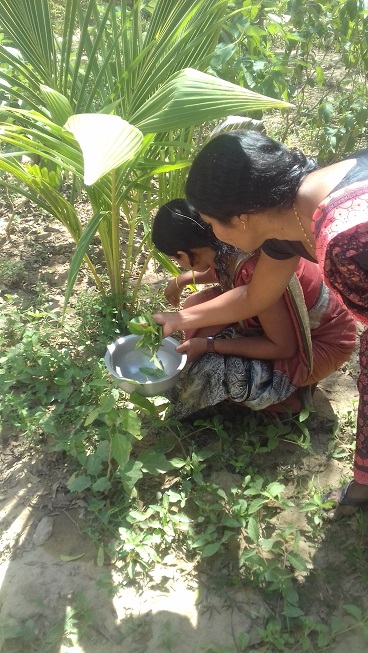 During the troubles, RJ said, all the families shared what they found. They shared information on where these things could be found. Since the end of the war the community has forgotten how to do this.
I asked RJ to tell me of some ‘forgotten foods’. These are often the discarded parts of popular vegetables. As he gives examples, RJ emphasises that he doesn’t want these foods to be considered medicinal herbs or special items for occasional use, but staple everyday foods.
Lotus:
Root: can be boiled with salt, and can be eaten like manioc. It can be fried, boiled or curried.
Seed: can be boiled and eaten like rice.
Flowers: can be cooked like cabbage.
Banana:
Stump: the tender core can be made into curries, mixed with
flour to make pittu and rotis. It can be used in stir fries.
Manioc:
Leaves: can be used in stir fries. They can be pounded and mixed
with flour to make bread, rotis, pittu.
Ridge Gourd:
Can be made into curries and used in stir fries.
Papaya:
The unripe fruit can be grated and used in stir fries. It can be
added to flour to make bread and pittu. It can be chopped into
small pieces, like potatos, and made into curries.
Kasini Leaves, also known as Gogu:
Easily found in the jungle, you should grind the leaves and add it to curries to thicken the
sauce, like tomato puree. This has a good flavour, and provides energy.
RJ emphasised that although he gets vegetables from his garden they grow naturally without his help. “I get my vegetables from my garden but I don’t plant them. There are enough just growing wild. God is cultivating it without polluting pesticide or fertiliser. Without cultivation, without artificial watering, vegetables are there in the garden, on the roadsides, and in the jungles. God is the farmer.”
The proof of the pudding is in the eating. So I travelled from Jaffna with some friends to RJ’s home in Malayalapuram, a village in the Killinochchi District. RJ is a beneficiary of the Indian Government’s housebuilding scheme for displaced people after the war. He still keeps his original mud floored home as an office for the organisation he now runs, Kaveri Kala Manram. It was here he brought us to prove his claim that he could cook a good meal mostly (he had purchased spices, onions, garlic and tomatoes) with foraged food.
“I take a free range chicken, and collect one kilo of green leaves from my garden. Cook the meat for 10 minutes, then add the green leaves, and continue cooking for 20 minutes. I have a very flavourful curry. The whole dinner is this one dish. My three children rush to eat this because it is very tasty”.
Chicken cut very small
Kovai
Moringa leaves
Thuthuvalla
Spinach
Passion fruit leaves
Curry leaves
Ponnankani
During the troubles, RJ said, all the families shared what they found. They shared information on where these things could be found. Since the end of the war the community has forgotten how to do this.
I asked RJ to tell me of some ‘forgotten foods’. These are often the discarded parts of popular vegetables. As he gives examples, RJ emphasises that he doesn’t want these foods to be considered medicinal herbs or special items for occasional use, but staple everyday foods.
Lotus:
Root: can be boiled with salt, and can be eaten like manioc. It can be fried, boiled or curried.
Seed: can be boiled and eaten like rice.
Flowers: can be cooked like cabbage.
Banana:
Stump: the tender core can be made into curries, mixed with
flour to make pittu and rotis. It can be used in stir fries.
Manioc:
Leaves: can be used in stir fries. They can be pounded and mixed
with flour to make bread, rotis, pittu.
Ridge Gourd:
Can be made into curries and used in stir fries.
Papaya:
The unripe fruit can be grated and used in stir fries. It can be
added to flour to make bread and pittu. It can be chopped into
small pieces, like potatos, and made into curries.
Kasini Leaves, also known as Gogu:
Easily found in the jungle, you should grind the leaves and add it to curries to thicken the
sauce, like tomato puree. This has a good flavour, and provides energy.
RJ emphasised that although he gets vegetables from his garden they grow naturally without his help. “I get my vegetables from my garden but I don’t plant them. There are enough just growing wild. God is cultivating it without polluting pesticide or fertiliser. Without cultivation, without artificial watering, vegetables are there in the garden, on the roadsides, and in the jungles. God is the farmer.”
The proof of the pudding is in the eating. So I travelled from Jaffna with some friends to RJ’s home in Malayalapuram, a village in the Killinochchi District. RJ is a beneficiary of the Indian Government’s housebuilding scheme for displaced people after the war. He still keeps his original mud floored home as an office for the organisation he now runs, Kaveri Kala Manram. It was here he brought us to prove his claim that he could cook a good meal mostly (he had purchased spices, onions, garlic and tomatoes) with foraged food.
“I take a free range chicken, and collect one kilo of green leaves from my garden. Cook the meat for 10 minutes, then add the green leaves, and continue cooking for 20 minutes. I have a very flavourful curry. The whole dinner is this one dish. My three children rush to eat this because it is very tasty”.
Chicken cut very small
Kovai
Moringa leaves
Thuthuvalla
Spinach
Passion fruit leaves
Curry leaves
Ponnankani
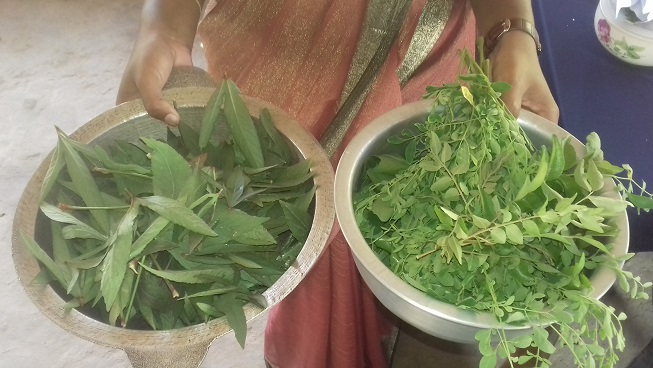 What did we think of RJ’s foraged lunch? To paraphrase Julius Caesar: we came, we ate, and we were conquered.
Mtullaitivu and Killinochchi, the main areas RJ operates, are two of he poorest districts in Sri Lanka. The people spend almost all their money on food, with no money left for health or education or to invest in their land and businesses.
They have no money to do the very things that would pull them out of poverty. Rev. Joshua has encouraged the community he serves to cook with the produce of their gardens. We visited a Food Festival he organised in a rural village pre-school. Here the people demonstrated their cooking, starting with a competition to make a soup in 30 minutes from vegetables found in the school playground. Having enjoyed the various soups, the cooks continued to forage and boil and stir over open fires. An hour later they put on a splendid vegetarian buffet.
I myself am no stranger to Colombo’s 5 Star hotel buffets. I can say with confidence dish for dish these rural cooks with their foraged ingredients were better. The serving trays weren’t made of polished steel, the plates weren’t the best bone china, the tables weren’t covered with fine linen, the floors weren’t of imported marble. But the taste, the textureand the colours of the food were better.
( — The writer Jekhan Aruliah was born in Sri Lanka and moved with his family to the UK when he was two years of age. Brought up in London, he graduated from Cambridge University in 1986 with a degree in Natural Sciences. Jekhan then spent over two decades in the IT industry, for half of which he was managing offshore software development for British companies in Colombo and in Gurgaon (India). In 2015 Jekhan decided to move to Jaffna where he is now involved in social and economic projects. He can be contacted at jekhanaruliah@gmail.com — )
What did we think of RJ’s foraged lunch? To paraphrase Julius Caesar: we came, we ate, and we were conquered.
Mtullaitivu and Killinochchi, the main areas RJ operates, are two of he poorest districts in Sri Lanka. The people spend almost all their money on food, with no money left for health or education or to invest in their land and businesses.
They have no money to do the very things that would pull them out of poverty. Rev. Joshua has encouraged the community he serves to cook with the produce of their gardens. We visited a Food Festival he organised in a rural village pre-school. Here the people demonstrated their cooking, starting with a competition to make a soup in 30 minutes from vegetables found in the school playground. Having enjoyed the various soups, the cooks continued to forage and boil and stir over open fires. An hour later they put on a splendid vegetarian buffet.
I myself am no stranger to Colombo’s 5 Star hotel buffets. I can say with confidence dish for dish these rural cooks with their foraged ingredients were better. The serving trays weren’t made of polished steel, the plates weren’t the best bone china, the tables weren’t covered with fine linen, the floors weren’t of imported marble. But the taste, the textureand the colours of the food were better.
( — The writer Jekhan Aruliah was born in Sri Lanka and moved with his family to the UK when he was two years of age. Brought up in London, he graduated from Cambridge University in 1986 with a degree in Natural Sciences. Jekhan then spent over two decades in the IT industry, for half of which he was managing offshore software development for British companies in Colombo and in Gurgaon (India). In 2015 Jekhan decided to move to Jaffna where he is now involved in social and economic projects. He can be contacted at jekhanaruliah@gmail.com — ) 
